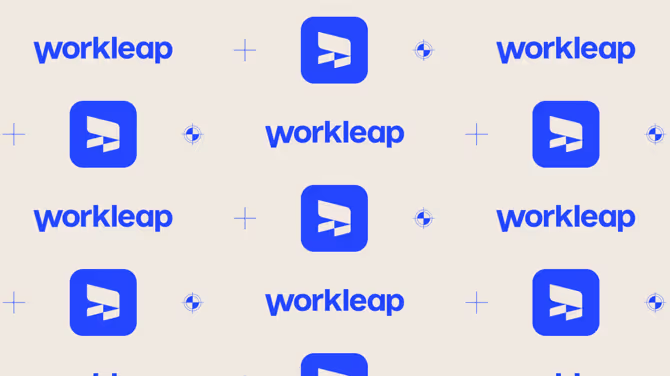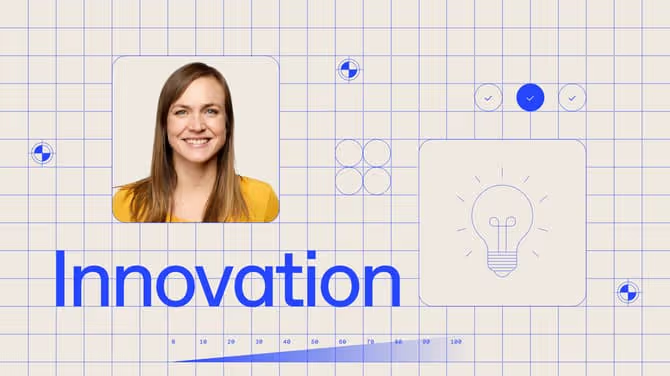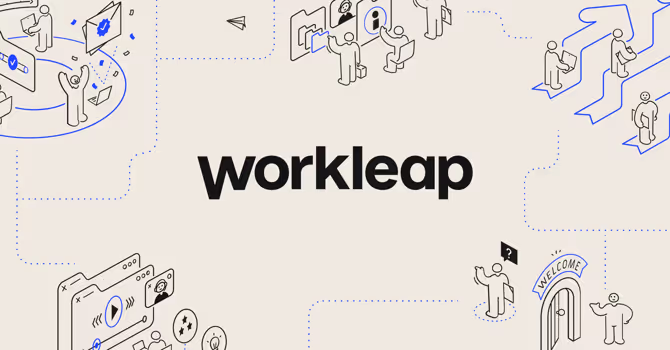The journey that led to Workleap

%20(1).png)
A letter from our CEO, Simon De Baene
Today marks a special day for myself and my team. It’s the start of a new era—a leap into a new, exciting venture that will enable us to change the way people work for the better.
Allow us to reintroduce ourselves. Our name is Workleap.
Workleap is more than just a new name for GSoft. It’s the result of building best-in-class employee experience (EX) tools for the better part of two decades and realizing that they should all work together. We became humble experts in the world of work and now have what it takes to tackle it in the best way possible.
The employee experience is often depicted as an oversimplified linear journey. The truth is it isn’t simple at all. It’s actually quite chaotic and ever-evolving. Especially at the rate the world is advancing and new needs are arising.
Workleap may not work miracles, but it sure will bring clarity to the chaos. It’ll help companies build EX foundations at their own pace and with the right tools. By connecting people and technology, Workleap will make sure fulfilling employee journeys go hand in hand with frictionless productivity, efficiency, and impact — regardless of what your company looks like.
And when you enable your people to work at their best, you have everything it takes to make miracles happen.
Let’s take a trip down memory lane to understand how we got here.
I founded GSoft 17 years ago with Guillaume Roy (GR) and Sebastien Leduc in a small Montreal apartment. We were three kids with big dreams who shared a passion for building great software.
Before I continue, let me give a quick disclaimer: this isn’t a “rags to riches” story. Yes, we have gained a lot of success since 2006. But we did so much more than that in those 17 years. This is the story of our journey — where we started, what we learned, and what brought us to where we are today.
We named GSoft after the famous early 2000s hip hop group, G-Unit. True story. We were big (okay, huge) fans. And being the impressionable 20-something-year-olds that we were, it seemed like a good idea at the time.
The company was very different back then. From the beginning, we knew we wanted to bring a breath of fresh air to the world of IT. The carpets, the cubicles, and the mood were too gray for us and we wanted to change that. Plus, the solutions that were available were clunky and difficult to use. Not our style. We knew we could make IT cooler and smarter with alternatives that were more straightforward.
So, we began our quest toward this mission as a service-led software development firm focused on building custom software for our clients. That formula worked for a while (about a decade), and we definitely learned a thing or two about making great software during that time.
Our first major shift happened in 2009. We decided to build a product of our own, and that’s how ShareGate came to be. A few years later, Officevibe, our second child, followed suit. In 2017, we dropped the service portion of the business and focused all our energy on building, iterating, and improving our two products and brands. At this point, our hearts were set on finding a better way to work. And we did this by bridging the gap between technology and people.
With the onset of the pandemic and the rise of hybrid work, the world of work needed a software update. Sharegate helped companies achieve more with their Microsoft 365 ecosystem. Officevibe kept a pulse on their people, helped them feel recognized, and empowered them to be productive despite the craziness going on in the world.
This major paradigm shift in the world and the workplace meant organizations and teams had to completely rethink how to work together. They constantly faced new challenges. And we knew we could help. Innovation was always in our DNA, and we found a way to bring it back to the forefront.
Enter the Innovation Lab: a team whose sole purpose was to innovate and build new software to meet these growing needs. And we did a lot of that. We have been hard at work for the last few years. The fruit of our labor? Softstart and Talentscope, onboarding and talent development tools, respectively.
We recently lived yet another “first time” when we completed our acquisition for a learning management system called Didacte. It showed us that as much as we love creating things of our own, we don’t always have to start from scratch. We can spot the potential in existing tools and bring them to the next level.

What a ride, eh? Our journey was dynamic and unpredictable, to say the least. What started as a software development company suddenly became a tech company with a portfolio of five SaaS products. They all had their own purpose in what we soon discovered was the link between all of them — employee and digital experience at work.
Our lightbulb moment came when GR and I were brainstorming names for our latest product, the talent development tool I mentioned earlier. We thought of Workleap and instantly knew we were onto something.
Workleap represented way more than career planning and skills development and it was too good to just keep for a single product. It stood for everything we did across the whole company. It stood for a kinder, smarter, and faster way to work.
Can you see where I’m going here? We analyzed our product stack, looked at the bigger picture, remembered why we started doing this in the first place and realized it was time for change.
Our future was Workleap: a unified brand, company, and ecosystem of software products that tackles the employee experience from many angles.
We knew it was a big move, but we were certain it was the right one. Workleap is a better reflection of who we are today and where we’re headed. So here I am, reintroducing the company I built with my buddies nearly two decades ago.
One thing is sure: we had to pass through all the trials and tribulations, victories, and learning opportunities to get to where we are today. Workleap would not be Workleap if GSoft never existed. It’s nice to take a step back and appreciate what got us here and what will allow us to take the leap forward.
So, what does this mean for the future?
To my team, we’ll be able to work as a more unified front. This change will set us up for success and allow us to focus on building better solutions in a more streamlined way. We’ll be primed to innovate like only we know how to. And we’ll do it faster than ever.
To our clients, Workleap will empower you to stay nimble in a world that’s constantly testing and asking you to adapt. We’ll be your ultimate sidekick to help you navigate the digital workplace and keep your team happy, engaged, and productive.
And to the world, we’re ready to redefine what it means to do great work. With Workleap, work will be simpler, kinder, and faster. With Workleap, work will really work.
The journey that took us here was a heck of a ride; I truly hope my words did it justice. But this is just the beginning. We have a lot of challenges to face, lessons to learn, and victories to claim. It’s time to be laser-focused on our quest to offer a better employee experience to all and empower everyone to work at their best.
We take the leap.
Simon
%20(1).png)











